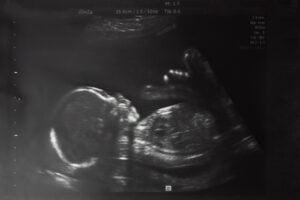Even if you haven’t heard of the term ‘FASD’ – Foetal Alcohol Spectrum Disorder – you’re probably aware that drinking alcohol while pregnant isn’t good for the developing baby. But surprisingly, the advice of medical professionals hasn’t always been clear on this point and until fairly recently, women were led to believe that the occasional glass of wine was probably harmless.
Eventually, in 2016, a government report was published stating that women should avoid alcohol completely when expecting. This stance was finally ‘set in stone’ as part of ‘NICE’ guidelines – the National Institute for Health and Clinical Excellence – in 2022.
What is FASD?

FASD is a range of neurological symptoms that can occur in a person if they have been exposed to alcohol in the womb. The severity of these symptoms depends on how much their mother drank while she was pregnant, how often and when. Many of the features mirror other neurodevelopmental conditions such as autism, ADHD, dyspraxia, speech and language problems, cerebral palsy or learning disability. In fact, a person may have many of these assigned to them before getting a diagnosis of FASD.
According to Jan Griffin, co-founder of ‘Road 2 FASD’ – an organisation that offers training and support and campaigns for greater awareness of the condition – the biggest hurdle is that many people, including health professionals, have scant knowledge of how it manifests.
“One of the biggest misconceptions is that everyone with FASD has distinctive facial features but actually, less than ten per cent of people have those,” she explains. “The other myth is that it doesn’t affect middle-class, educated families.”
Damage Can be Done Before you Realise you’re Pregnant

Many women, Jan points out, don’t know they’re pregnant at first and continue to drink alcohol. When their children turn out to have difficulties, people don’t necessarily make the connection, making FASD a kind of ‘hidden’ disability.
Her own experience was that she’d been told that she couldn’t have any more children, so it didn’t cross her mind that her unusual symptoms were actually because she was pregnant. She carried on drinking moderately as she always had, enjoying a couple of pints with colleagues after work or a glass of wine at the weekend.
When she discovered she was carrying a child, the doctors suspected that the foetus had genetic problems and suggested she terminated the pregnancy, though no-one mentioned FASD. Jan refused. “I’d always felt there was another space at the table,” she recalls, “so I was happy to continue, whatever the outcome.”
A Long Time to Identify FASD

Her son Rossi, now aged twenty-two, was born severely underweight but went on to meet his milestones. “He twitched a lot as a baby but when I mentioned it to the health visitors, they wouldn’t listen,” Jan continues. “He eventually developed epilepsy. I also noticed he kept making the same mistakes. I’d explain something to him and he appeared to understand but would do the same thing again. He was also forgetful but would remember poems and songs.”
By the time Rossi was twelve, he’d been diagnosed with myriad conditions but still, no-one mentioned FASD. “He had just about every label going – social issues, not listening, hyperactivity, autism, gender dysphoria – and school said he was ‘naughty’. He tried to kill himself at the age of ten and at fifteen, he had a breakdown.”
“One day, in despair, I sat down at the computer and entered all his symptoms, just to see what came up,” Jan goes on. “I came across a website for a FASD clinic in Surrey and it was like they were describing Rossi’s life. I always say it was like someone had thrown a brick through the computer screen – everything was broken but it also became clear.”
Difficult to Accept

There was a period of grief, Jan says, coming to terms with her son’s situation and although she was angry that no-one had told her about the condition, she has never felt guilty because it was never her intention to harm him. “I’d like to get other parents like me to come out of the woodwork,” she comments. “There’s a lot of judgement and stigma about FASD.
“My experience of young people with FASD is that they all have something amazing about them,” she concludes, “they usually excel at something creative. Rossi has always been interested in fashion and make-up and he’s just started appearing on a TV programme called, ‘Glow Up’. Don’t spend your life battling ‘bad’ behaviour – find their ‘brilliant’ and steer them towards that.”
Jan and Rossi also share their story at www.birthmumandson.co.uk
Would you like to know more about Road2FASD?
Please click here: https://road2fasd.com/. On their website they mention that: “Road2FASD is committed to making a positive impact on the lives of those with FASD and their families by leveraging the wealth of lived experiences within the organization. Our primary goal is to contribute to improved outcomes for individuals with FASD. This may involve various initiatives, such as awareness campaigns, educational programs, and support services tailored to the unique needs of individuals with FASD and their families.”




